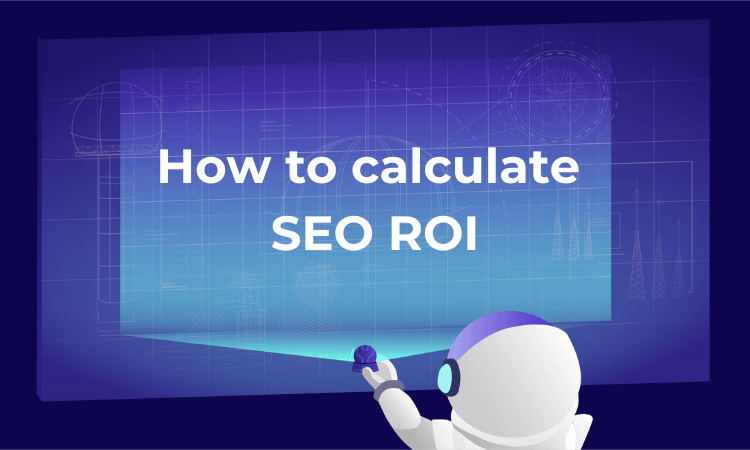How do you know if your SEO are succesful? That’s a difficult question that many companies can’t really answer as SEO is hard to measure with the same precision as most other channels. Nonetheless is it crucial to know if your SEO are generating not only revenue but profits.
The SEO ROI is an important factor for any business working with SEO inhouse or even when outsourcing the execution to SEO agencies.
You need to know the profit numbers to evaluate the work done by your agency and especially when you need to convince the company leadership to even invest in SEO in the first place or to increase SEO budgets.
In this post I’ll walk you through how you calculate SEO ROI and why you should care.
What Is the ROI of SEO?

Return on Investment (ROI) in the context of SEO refers to the measure of the profitability of your SEO efforts. It reveals the return you get from the money, time, and resources invested in optimizing your website for search engines. In simpler terms, it answers the question:
“Is the money and effort put into SEO generating more value in terms of revenue than it costs?”
To calculate ROI on SEO, you compare the revenue generated from organic search traffic (i.e., visitors who find your website through unpaid search engine results) against the costs to implement and maintain SEO strategies. This calculation helps businesses understand the effectiveness of their SEO initiatives and make informed decisions about allocating resources to maximize returns.
Essentially, a positive ROI indicates that your SEO efforts are paying off by driving more traffic, leads, and conversions, ultimately contributing to the bottom line of your business. Conversely, a negative ROI suggests that your SEO investments are not yielding satisfactory results and may require adjustments or reallocation of resources to maintain a profitable business.
Understanding and optimizing SEO ROI is crucial for businesses to justify their investments in SEO, prioritize efforts, and achieve sustainable growth in online visibility and revenue.
Why you should care about ROI on SEO
Knowing where companies money goes is an important part of running a business. It’s important to understand the financial value of your SEO efforts as well as any other marketing channel to make informed decisions and to know what platforms are working and which that aren’t for your business.
Measuring ROI on SEO is essential for several reasons:
- Justification of Investments: By measuring ROI, businesses can justify the resources allocated to SEO initiatives. It helps in demonstrating the value generated from SEO efforts and provides a clear picture of how SEO contributes to the overall business objectives.
- Resource Allocation: Understanding SEO ROI enables businesses to allocate resources effectively. It helps in identifying high-impact SEO strategies and channels that deliver the best returns. By allocating resources based on ROI, businesses can optimize their budget allocation and focus on activities that yield the highest results.
- Performance Evaluation: Measuring ROI allows businesses to evaluate the performance of their SEO campaigns objectively. It helps in assessing the effectiveness of different tactics, strategies, and campaigns. By tracking ROI over time, businesses can identify trends, successes, and areas for improvement in their SEO efforts.
- Decision Making: ROI data serves as a valuable tool for making informed decisions about SEO investments. It helps businesses prioritize initiatives, choose between different strategies, and allocate budgets strategically. By understanding the ROI of various SEO activities, businesses can make data-driven decisions that maximize returns and minimize risks.
- Goal Setting and Benchmarking: Measuring ROI helps in setting realistic goals and benchmarks for SEO performance. It provides insights into the expected outcomes of SEO efforts and helps businesses track progress towards achieving their objectives. By setting measurable goals based on ROI, businesses can track their performance, identify areas for improvement, and optimize their strategies accordingly.
- Overall, measuring ROI on SEO is crucial for demonstrating the value of SEO investments, optimizing resource allocation, evaluating performance, making informed decisions, and setting realistic goals. It helps businesses maximize the impact of their SEO efforts and achieve sustainable growth in online visibility and revenue.
What’s challenging about determining SEO Return On Investment?

Determining SEO return on investment (ROI) can be challenging due to several factors. Attribution of sales from marketing channels is a huge topic to debate, but bottom line is that it is simply impossible to attribute sales 100% correct due to several touchpoints, way of attributing, etc.
Let me explain some of the normal challenges of attributing SEO ROI:
Long timeframe for results: SEO is a mid to long-term strategy that takes time to yield significant results. It can be challenging to attribute specific outcomes directly to SEO efforts, especially in the short term. The delay in seeing tangible results makes it difficult to measure the immediate impact of SEO on ROI.
Multiple variables at play: SEO performance can be influenced by various factors such as algorithm updates, changes in competition, website design changes, and market trends. It’s challenging to isolate the effects of SEO from other marketing activities or external factors that may also contribute to business outcomes.
Complexity of algorithms: Search engine algorithms are complex and constantly evolving. What works for SEO today may not be as effective tomorrow due to algorithm changes or updates. Keeping up with these changes and understanding their impact on SEO performance adds to the complexity of measuring ROI accurately.
Attribution challenges: Attribution is the process of assigning credit to different marketing channels for the sales (or other types of conversions you are measuring). With SEO, attributing conversions solely to organic search traffic can be difficult, especially in multi-channel marketing environments where customers interact with multiple touchpoints before making a purchase.
Investment allocation across channels: Businesses often invest in multiple marketing channels simultaneously, making it challenging to attribute specific outcomes to SEO alone. Understanding how SEO contributes to overall marketing performance and ROI requires comprehensive tracking and analysis of cross-channel interactions.
Addressing these challenges requires a holistic approach to measuring SEO ROI, incorporating data analysis, tracking tools, attribution modeling, and a deep understanding of the unique dynamics of each business and industry. Despite the complexities involved, accurately measuring SEO ROI is essential for optimizing marketing strategies, demonstrating the value of SEO investments, and making informed business decisions.
What is the cost of SEO?
Agencies and SEO professionals have for years been running around with the phrase “SEO traffic is free”. This have been the story for as long as I have been working with SEO and have almost become the truth in general.
Unfortunately, this is a misconsumption that needs to be enlightened and spoken out loud.
SEO traffic is not free.
To get organic traffic you are investing in different ressourcers that will have a cost. Your cost to get SEO traffic can be a lot of things. For example inhouse ressourcers, agencies, freelancers, consultants, SEO tools and likely other things too.
What I am trying to say is just that SEO traffic isn’t free. Best case you can do it yourself – but your ressources isn’t free either. Your time is valuable even if you remove the salary aspect.
How to Measure the ROI of SEO
Understanding the Return on Investment (ROI) of your Search Engine Optimization (SEO) efforts is crucial for any business aiming to maximize its online presence and drive sustainable growth.
So, let’s dig into the way if calculating the ROI.

1. Calculate SEO expenses
First step of calculating SEO ROI is to know your costs. This contains all the costs and not only the things that requires direct payment for a service.
The following is the most common costs of doing SEO:
Inhouse teams and ressourcers
The inhouse ressourcers are often the one that most businesses tends to forget when calculating SEO ROI.
This is a problem that will blur the actual ROI. You might have employees working with SEO 100% of their work day. Or maybe you have a smaller teams that are generalist working with everything from copywriting, web development and SEO.
If your employees are working only part time on SEO, you need to break down their time spent on SEO tasks on hourly or daily rates to know the actual cost of doing SEO.
Agencies, freelancers and SEO consultants
The easiest expense to measure is all the external work done by agencies and freelancers as you’ll often have a retainer contract with them with a fixed monthly rate.
SEO tools
If you or your team works with SEO inhouse you’ll most likely have expenses to SEO tools like Morningscore. Add the full monthly fee for SEO tools to your calculations unless you have tools that are used to more than just SEO, then you can consider only calculating parts of the expense for SEO cost.
2. Track and attribute conversions
Now to the hard part. Tracking and attributing conversion correct to get the most exacts picture is – as mentioned previously – not an easy task.
Nonetheless, it’s important to track as precise as possible (100% exact is impossible).

To track your conversions you need one or more tools like Google Analytics, Plausible or similar tracking tools to track, measure and attribute conversions from SEO traffic.
What kind of conversions you track and how you assign conversion values is individual from business to business.
If you are running an ecommerce business it’s quite straight forward as you will track purchases and revenue from your sales data tracked by for example Google Analytics.
If you are collecting leads it’s a little bit more tricky. To track lead conversions you need to setup “events”. A goal is e-mail signups, form submissions, trial signups or however you collect leads.
Visit this guide for setting up purchase and lead tracking in Google Analytics.
Lastly, you need to assign each lead conversion to an estimated value as you don’t have a direct purchase.
Customer lifetime value x lead conversion rate
Tracking the value of leads from SEO requires additional data to fully setup and calculate your SEO ROI.
First of all you need to know your Customer Lifetime Value. Customer Lifetime Value is a metric used to estimate the total value a customer brings to a business over the entire duration of their relationship. The calculation you need to find your Customer Lifetime Value is:
AveragePurchaseValue × PurchaseFrequency × AverageCustomerLifespan / CustomerChurnRate = Customer Lifetime Value.
- Average Purchase Value is the average amount of money a customer spends in a single transaction.
- Purchase Frequency is the average number of transactions a customer makes over a specific period, such as a month or a year.
- Average Customer Lifespan is the average duration a customer continues to engage with the business before churning or discontinuing their relationship.
- Customer Churn Rate is the rate at which customers stop doing business with the company over a given period. It’s typically expressed as a percentage.
Let’s take an example of how that calculation could look:
Customer Lifetime Value is $10.000
Your “lead to purchase” conversion rate is 10%
So, if those are your numbers you should set your event value in Google Analytics for leads to be $1.000, meaning that the value of a lead is $1.000.
3. Calculate Your Return on Investment
Now you should have all your numbers or at least you will in the future if you have just started tracking your conversion values and expenses now.
Time to calculate the ROI on your SEO using this formula: ValueOfConversions – costs / cost
Let’s take an example to break it down (it’s very simple so don’t get confused of all the numbers and formulas).
Your SEO efforts have generated $50.000 in a single month.
At the same time you have invested $12.500 in salaries, tools, agencies, etc.
In this example the formula would look like this:
$50.000 – $12.500 / $12.500 = 3.
What does that mean?
It means that you earn money. For every dollar spend you get a return of $3 – or you can say that you get 300% in return.
Use this simple formula to calculate the ROI on your SEO and measure if you make money on your SEO efforts.
Forecast SEO ROI and why not to rely on it
Let’s start with the disclaimer: Do not rely or trust blindly on SEO forecasts. Most SEOs and agencies knows the struggle when they are asked for an SEO forecast and what ROI they can expect as the road isn’t that straight forward.

It’s an important part of the decision proces for business owners and you need something – realistic – to present whether you run an agency or are an employee trying to convince your boss that SEO is the way to go. Show the potential and walk the talk.
Let’s look into the numbers and metrics to look at when making SEO forecasts
Set Clear Objectives: Define clear and specific goals for your SEO campaign, such as increasing organic traffic, improving keyword rankings, or boosting conversions. Align these objectives with your overall business goals and revenue targets.
Keyword Research and Analysis: Conduct thorough keyword research to identify relevant keywords and phrases with high search volume and commercial intent. Analyze keyword competitiveness and search trends to prioritize target keywords that offer the greatest potential for ROI.
Traffic Estimation: Estimate the potential increase in organic traffic by targeting specific keywords and optimizing your website for search engines. Use tools like Morningscore to forecast traffic based on search volume and keyword rankings. In Morningscore you’ll simply go to the “mission” tool, add your keyword and enter the ranking goal for the keyword and receive a traffic forecast.
Conversion Rate Optimization (CRO): Analyze your current conversion rates and identify areas for improvement on your website, such as landing page optimization, user experience enhancements, and call-to-action optimizations. Estimate the potential uplift in conversion rates resulting from SEO initiatives.
Revenue Forecasting: Estimate the potential increase in revenue generated from organic traffic based on projected traffic volumes and conversion rates. Use historical data, industry benchmarks (if available), and seasonality trends to make informed revenue projections.
Cost Analysis: Evaluate the costs associated with implementing SEO strategies, including personnel costs, agency fees, software subscriptions, content creation expenses, and any other relevant expenses. Consider both initial investment costs and ongoing maintenance costs.
ROI Calculation: Calculate the projected Return on Investment (ROI) by comparing the expected revenue generated from SEO efforts to the total cost of investment using the same formula as mentioned previously:
ValueOfConversions – costs / cost
FAQ
What is SEO ROI?
SEO ROI (Return on Investment) is a measure of the profitability of your SEO efforts compared to the resources invested. It helps businesses measure the effectiveness of their SEO strategies in generating revenue and achieving business objectives.
Can I track conversion specifically to SEO?
Yes you can, but not with 100% precision. Tracking conversions with 100% precision solely to SEO efforts can be challenging due to the interconnected nature of digital marketing channels and the potential for cross-channel interactions. Conversions often result from a combination of various touchpoints, including paid ads, organic social media, brand recognition, and other factors, in addition to SEO.
What factors contribute to SEO ROI?
Several factors influence SEO ROI, including organic traffic growth, keyword rankings, conversion rates, average order value, customer lifetime value, and the cost of SEO implementation and maintenance.
How do I measure revenue from organic search traffic?
You can measure revenue from organic search traffic by setting up e-commerce tracking in Google Analytics or by integrating your analytics platform with your CRM system to track the source of leads and conversions.
What are some common challenges in calculating SEO ROI?
Common challenges include accurately attributing conversions to SEO, accounting for cross-channel interactions, estimating long-term benefits, and dealing with fluctuations in search engine algorithms and rankings.
Additionally, there is potentially big gaps between your investment and the return. SEO can take a long time but, hence the return can drag out.
How can I improve my SEO ROI?
Focus on optimizing for high-value keywords (at Morningscore we call them “money keywords”), improving website conversion rates, enhancing user experience, creating high-quality content, building authoritative backlinks, and regularly monitoring and adjusting your SEO strategies based on performance data.
Is it possible to guarantee a positive ROI from SEO?
While there are no guarantees in SEO due to factors beyond your control (e.g., search engine algorithm changes, competitive landscape), implementing best practices and data-driven strategies can increase the likelihood of achieving a positive ROI over time.












